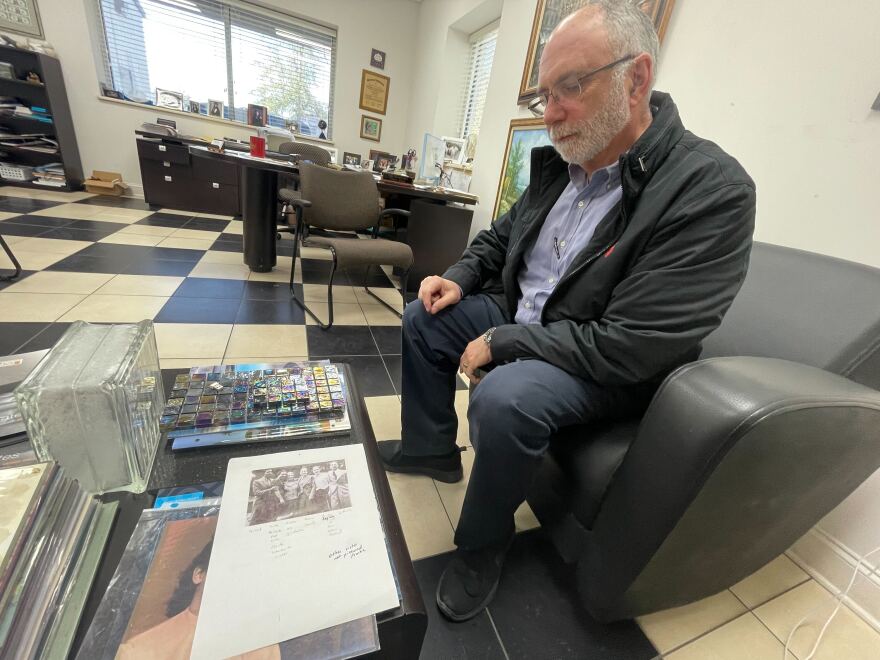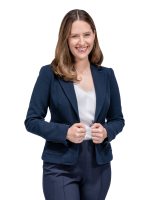Felix Goldberg's painted portrait hangs over the tile business he opened decades ago in Columbia.
With his signature, large wire-rimmed glasses and closed smile, slightly upturned, he can watch over the life he created from scratch — a life created through human tragedy and sacrifice turned into familial success.
Sitting in that very title business, Esther Goldberg Greenberg, daughter of the late Felix and Bluma Goldberg, sits with her brother Karl, flipping through a scrapbook of family photos of her parents and their kids, including their eldest brother, Henry.
"Dad was such a character. I mean, he had a lot of perseverance," she said.
In one example she shared, she said her father and his friend, David Miller "during one of the famous death marches at the end of the war, ... were walking arm-in-arm, and they came to a place where a local farmer was boiling potatoes and giving them to the prisoners and to the Germans. And the Germans said to the prisoners, 'If you walk through this line more than one time, we're going to shoot you right on the spot.' And do you know how many times my father walked through that line? Like seven times. He took those kinds of chances, because he knew he had to eat and he knew that it was worth the chance for him to possibly be killed."
Karl added, "And by the way, every time he told that story, the number of times he went through the line went up."

Felix and Bluma survived one of the worst human tragedies in the modern era.
Most of their siblings, parents, grandparents and other extended family and friends died in the Holocaust.
They survived. So did Cela, Bluma's sister.
Bluma and Cela later met their husbands, friends Felix and David Miller respectively, and married together at a displaced persons camp in Germany. Felix and Bluma came to Columbia in 1949, shortly behind Cela and David.
Felix died in 2000 and Bluma in 2021.
Cela and David's son, Henry Miller, said his parents lost everything, and rarely spoke to him or his sister, Rita, about their experience and survival.
Cela died in 2000, his father 2011.
"My father used to say, 'Why would I talk about it? No one would have ever believed me if I told them what happened during the war. No one would have believed me. So why would I have talked about it when I first came to America?'" Henry Miller said. "After my parents did pass away, I kind of then tried to take on the responsibility of doing a lot of speaking."
Today, few Holocaust survivors, a label with an expanded definition, remain alive.
An international organization that works with Holocaust survivors, estimates that the number in the U.S. is about 50,000.
In South Carolina, the state's Council on the Holocaust doesn't have a firm number. The Jewish Federation in Charleston says it is aware of at least three still living in their area.
In a growing state with a large retiree population, the council's executive director, Scott Auspelmyer, said the numbers of survivors can be hard to track.
"We had a survivor in our midst that we didn't even know, you know, in Charleston area that lived there for, I think, maybe a couple of years who had already been retired for a while and then moved there. And nobody knew that," he said. "I wouldn't be surprised if there are clearly other survivors that we do not know about living in South Carolina, just because it is becoming an area that is growing, you know, in terms of people from other states moving here. But the other reality is we have so few survivors, period, you know, not just in South Carolina, because it's almost 80 years since World War Two."

But thanks to videos and recordings on the internet, in addition to Holocaust museums and centers, their stories can live on.
Their children and grandchildren, like Charleston Jewish Federation's Erin Boynton, whose grandfather was born in the caves of Ukraine during the Holocaust and speaks publicly, are seeking to do the same.
"I'm very fortunate. There are tons and tons of videos of my grandfather speaking online, and so I incorporate his voice into my own presentation," she said. "I remember being on the phone with my grandfather for like hours because I was just trying to make sure I got every single detail correct. And I was telling it like he was telling it. ... That's not what I need to do. I need to tell my story. ... I am my grandfather's legacy."
Educators and survivors' family members say Holocaust education has become more critical, in large part due to the rise in antisemitism.
The Anti-Defamation League says more than 2,000 antisemitic-related incidents have been reported nationwide since the Oct. 7 terror attack on Israel.
Frank Baker, who wrote a graphic novel about Felix and Bluma Goldberg's story, "We Survived the Holocaust," covering their lives before the Holocaust during and after, said it's important to teach the connections between past and present.
"We preach never forget, and never again, and, unfortunately, it is happening again. And, of course, we can't forget. We have to teach these lessons," he said. "And I think we have to be aggressive about it, and aggressive in a way that we challenge students about where they get their information and their news."
It's a large part of why Baker, also a media literacy specialist, wrote the novel.
"Mr. Goldberg spoke at our synagogue here in Columbia about his Holocaust experience, and the occasion was Yom HaShoah, the Day of Remembrance, and I remember sitting in that crowd of a couple of 100 people, and I was so oblivious to them because I was riveted by what he was saying, his experiences," Baker recalled. "And the ceremony ended and he came off the stage, ... and as I got to him, he handed me that that speech and he said in this really beautiful Polish accent, 'Frank, Frank, do something with this.'"
South Carolina is also home to the Anne Frank Center on the University of South Carolina's campus, the official U.S. partner and the only North American partner site of the Anne Frank House and Amsterdam.
It's a big get for a state that has wrestled with its own tragedies, spurred by hate.
The center's executive director, Doyle Stevick, says it's important to speak openly and transparently about what antisemitism and hate can do.
"But to get at the deep stuff, you know, cultivating these positive, social dispositions, positively influencing future civic behavior, those are really hard things to get at and it takes a different kind of experience than we can get at with most multiple choice tests and, you know, skill-based competencies," he said. "Those things are important, but we need that and more. So trying to figure out, what does it take to be able to have a real dialogue where we can be open to different points of view to changing our minds."
But how do you talk about the Holocaust amid a rise in antisemitism, Israel's war in Gaza following the Oct. 7th terror attack, and in the background, a fast-paced social media world, where it can be often unclear what is fact and not? And how do you talk about it in today's classroom?
"Welcome to the complications of education, the challenges of being a teacher," the Holocaust council's Auspelmyer said.

Abe Wandersman, another child of Holocaust survivors who was born in a displaced person's camp in Germany, said it's important to keep welcoming the conversation.
"... The real legacy should include not only what it meant to the 6 million people, and their relatives, people like me and many others, and it wasn't just Jews, but 6 million Jews, but what people are capable of and what we have to do to not have that happen," he said.
It's important, others said, even if it elicits some discomfort.



